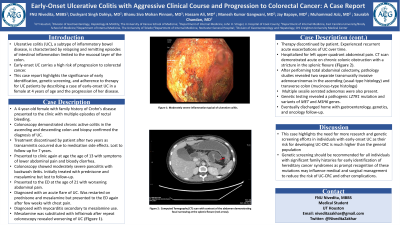Tuesday Poster Session
Category: IBD
P3685 - Early-Onset Ulcerative Colitis With Aggressive Clinical Course and Progression to Colorectal Cancer: A Case Report
Tuesday, October 24, 2023
10:30 AM - 4:00 PM PT
Location: Exhibit Hall

Has Audio

Fnu Nivedita
UT Houston
Houston, TX
Presenting Author(s)
Fnu Nivedita, 1, Dushyant Singh. Dahiya, MD2, Bhanu Siva Mohan Pinnam, MD3, Hassam Ali, MD4, Manesh Kumar Gangwani, MD5, Jay Bapaye, MBBS, MD6, Muhammad Aziz, MD5, Saurabh Chandan, MD7
1UT Houston, Houston, TX; 2University of Kansas School of Medicine, Kansas City, KS; 3John H. Stroger, Jr. Hospital of Cook County, Chicago, IL; 4ECU Health Medical Center / Brody School of Medicine, Greenville, NC; 5University of Toledo, Toledo, OH; 6Rochester General Hospital, Rochester, NY; 7Creighton University School of Medicine, Omaha, NE
Introduction:
Ulcerative colitis (UC) is characterized by relapsing and remitting episodes of intestinal inflammation. Early-onset UC carries a high risk of progression to colorectal cancer. This case report highlights the significance of early identification, genetic screening, and adherence to therapy for UC patients.
Case Description/Methods:
A 4-year-old female presented to the emergency department (ED) with multiple episodes of rectal bleeding. On diagnostic work-up, colonoscopy revealed chronic active colitis in the ascending and descending colon, and biopsy confirmed the diagnosis of UC. Following initial treatment, the patient opted for non-medical treatment with diet modification and was lost to follow-up for 9 years.
At age 13, she re-established care due to worsening symptoms of lower abdominal pain and bloody diarrhea. Repeat colonoscopy demonstrated moderately severe pancolitis with backwash ileitis (Figure 1). Treatment with prednisone and mesalamine significantly improved her symptoms, but she discontinued medications and was again lost to follow-up.
At age 21, she presented to the ED with worsening abdominal pain and was diagnosed with an acute flare of her UC. She was started on prednisone and mesalamine. However, few weeks after therapy, she presented to the ED with chest pain and was diagnosed with myocarditis secondary to mesalamine use. Mesalamine was discontinued. A repeat colonoscopy showed worsening UC. Infliximab was initiated, but due to financial constraints, the patient discontinued medical therapy. Over the next few years, she continued to experience recurrent acute exacerbations of UC.
On her most recent hospitalization for left upper quadrant abdominal pain, a CT scan in the ED demonstrated acute on chronic colonic obstruction with a stricture in the splenic flexure. A total abdominal colectomy was performed. Pathology studies identified two separate transmurally invasive adenocarcinomas in the ascending (usual-type histology) and transverse colon (mucinous-type histology). Multiple sessile serrated adenomas were also present. Subsequent genetic testing revealed a pathogenic LZTR1 mutation and variants of MET and MSH6 genes. She was eventually discharged home with gastroenterology, genetics, and oncology follow-up.
Discussion:
This case highlights the need for more research and genetic screening efforts in early-onset UC. Identifying hereditary cancer syndromes and optimizing management strategies can mitigate UC-CRC risk.

Disclosures:
Fnu Nivedita, 1, Dushyant Singh. Dahiya, MD2, Bhanu Siva Mohan Pinnam, MD3, Hassam Ali, MD4, Manesh Kumar Gangwani, MD5, Jay Bapaye, MBBS, MD6, Muhammad Aziz, MD5, Saurabh Chandan, MD7. P3685 - Early-Onset Ulcerative Colitis With Aggressive Clinical Course and Progression to Colorectal Cancer: A Case Report, ACG 2023 Annual Scientific Meeting Abstracts. Vancouver, BC, Canada: American College of Gastroenterology.
1UT Houston, Houston, TX; 2University of Kansas School of Medicine, Kansas City, KS; 3John H. Stroger, Jr. Hospital of Cook County, Chicago, IL; 4ECU Health Medical Center / Brody School of Medicine, Greenville, NC; 5University of Toledo, Toledo, OH; 6Rochester General Hospital, Rochester, NY; 7Creighton University School of Medicine, Omaha, NE
Introduction:
Ulcerative colitis (UC) is characterized by relapsing and remitting episodes of intestinal inflammation. Early-onset UC carries a high risk of progression to colorectal cancer. This case report highlights the significance of early identification, genetic screening, and adherence to therapy for UC patients.
Case Description/Methods:
A 4-year-old female presented to the emergency department (ED) with multiple episodes of rectal bleeding. On diagnostic work-up, colonoscopy revealed chronic active colitis in the ascending and descending colon, and biopsy confirmed the diagnosis of UC. Following initial treatment, the patient opted for non-medical treatment with diet modification and was lost to follow-up for 9 years.
At age 13, she re-established care due to worsening symptoms of lower abdominal pain and bloody diarrhea. Repeat colonoscopy demonstrated moderately severe pancolitis with backwash ileitis (Figure 1). Treatment with prednisone and mesalamine significantly improved her symptoms, but she discontinued medications and was again lost to follow-up.
At age 21, she presented to the ED with worsening abdominal pain and was diagnosed with an acute flare of her UC. She was started on prednisone and mesalamine. However, few weeks after therapy, she presented to the ED with chest pain and was diagnosed with myocarditis secondary to mesalamine use. Mesalamine was discontinued. A repeat colonoscopy showed worsening UC. Infliximab was initiated, but due to financial constraints, the patient discontinued medical therapy. Over the next few years, she continued to experience recurrent acute exacerbations of UC.
On her most recent hospitalization for left upper quadrant abdominal pain, a CT scan in the ED demonstrated acute on chronic colonic obstruction with a stricture in the splenic flexure. A total abdominal colectomy was performed. Pathology studies identified two separate transmurally invasive adenocarcinomas in the ascending (usual-type histology) and transverse colon (mucinous-type histology). Multiple sessile serrated adenomas were also present. Subsequent genetic testing revealed a pathogenic LZTR1 mutation and variants of MET and MSH6 genes. She was eventually discharged home with gastroenterology, genetics, and oncology follow-up.
Discussion:
This case highlights the need for more research and genetic screening efforts in early-onset UC. Identifying hereditary cancer syndromes and optimizing management strategies can mitigate UC-CRC risk.

Figure: moderately severe inflammation typical of ulcerative colitis
Disclosures:
Fnu Nivedita indicated no relevant financial relationships.
Dushyant Dahiya indicated no relevant financial relationships.
Bhanu Siva Mohan Pinnam indicated no relevant financial relationships.
Hassam Ali indicated no relevant financial relationships.
Manesh Kumar Gangwani indicated no relevant financial relationships.
Jay Bapaye indicated no relevant financial relationships.
Muhammad Aziz indicated no relevant financial relationships.
Saurabh Chandan indicated no relevant financial relationships.
Fnu Nivedita, 1, Dushyant Singh. Dahiya, MD2, Bhanu Siva Mohan Pinnam, MD3, Hassam Ali, MD4, Manesh Kumar Gangwani, MD5, Jay Bapaye, MBBS, MD6, Muhammad Aziz, MD5, Saurabh Chandan, MD7. P3685 - Early-Onset Ulcerative Colitis With Aggressive Clinical Course and Progression to Colorectal Cancer: A Case Report, ACG 2023 Annual Scientific Meeting Abstracts. Vancouver, BC, Canada: American College of Gastroenterology.
